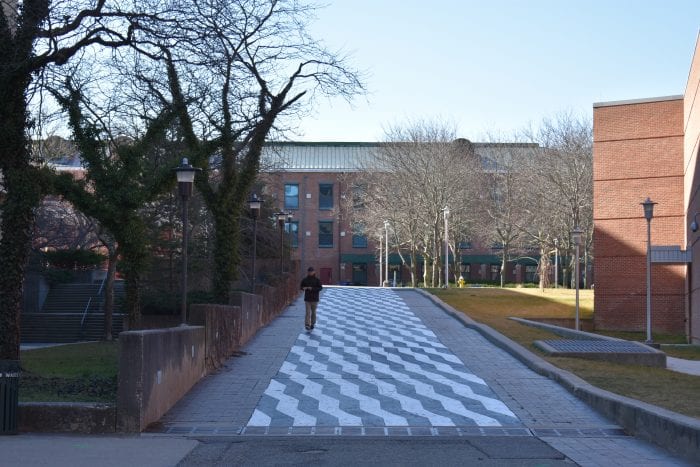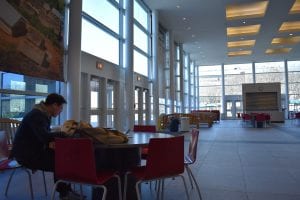Community Reacts to Stony Brook’s Financial Plight
As University Stares Down Barrel of $109 Million Financial Hole, Local Community and Businesses Could See Economic Hurt

By Kyle Barr, Rita J. Egan and Liam Cooper
Stony Brook University is one of the biggest driving economic engines of the North Shore. Not only does it offer a major learning institution for students all over Long Island, but it has facilitated a large number of housing possibilities for both faculty and students. Those students, meanwhile, are a live force generating sales for local restaurants, bars and shops.

SBU’s announcement that it is facing at least a $109 million hole has sent a shudder through the residential and business side of the surrounding community. It has put yet another stake through the heart of so many economic centers that are already struggling from their own pandemic-related hurt.
Three Village Expects Hardship
Gloria Rocchio, president of The Ward Melville Heritage Organization, recognized the effect Stony Brook University’s financial woes would have not only on Stony Brook Village Center, which WMHO oversees, but also a broader region extending beyond the Three Village area. The shops in Stony Brook are less than five miles from the university.
SBU “is the largest employer on Long Island and that needs to be addressed,” she said. “The fact is the impact is not only going to affect the local community but the Long Island community. The ripple effect will be extraordinary.”
George Hoffman, 1st vice president of the Three Village Civic Association, echoed Rocchio’s sentiments.
“Unfortunately, I do think we will see some painful impacts in the community from the university’s dire fiscal situation,” he said. “The hiring freeze will reduce the pool of people buying homes in the area. Canceling the athletic season will hurt the restaurants and pubs. And having three-quarters of the students take courses online instead of on campus, will hurt restaurants and local shops that count on student customers. Stony Brook University has such a regional multiplier effect that their cuts and loss of revenue will reverberate through our area and through the entire Long Island community.”
Jane Taylor, executive director of the Three Village Chamber of Commerce, said the hope is that any effect on the community would be short lived.
“We’re grateful for the faculty and staff who support our local businesses,” she said. “This is definitely going to have an impact.”
Impact on Port Jefferson Village
It’s hard to gauge how much business Port Jefferson generates from Stony Brook, though recent efforts to increase the number of students and staff into the village has already been squashed due to COVID-19. The village has been funding everything but the campus-side advertising for the PJ-SBU Shuttle for the past two years. The village was putting up around $20,000 of its funds for the project, while the Port Jeff Business Improvement District also put up $10,000 of its funds to help support the shuttle program.
The shuttle program was canceled due to COVID-19 March 15. Kevin Wood, the village’s parking and mobility administrator, said the shuttle was averaging about 150 riders a weekend before being canceled.

“We will look to restart it for the spring 2021 semester depending on the state of the COVID-19 and restrictions,” he said in an email. “We will also look to share the expense equally between the village, the BID and SBU.”
Barbara Ransome, Greater Port Jefferson Chamber of Commerce director of operations, said the pandemic has already done such a number on local businesses. She said village businesses are open and are being “respectful and careful” in compliance with New York State regulations, and she hopes those shops that stayed strong will survive, barring another shutdown.
“My gut would say sure, it’s going to affect us,” she said. “The Port Jefferson Village is going to have a deficit — everyone is going to have a deficit. Everything’s going to have a trickle-down effect.”
Impact on Real Estate
Multiple local realtors in the surrounding community said the effect on the housing market surrounding the university is still uncertain, though a loss of students and faculty because of enrollment declines and a hiring freeze could put a damper on the industry.
“The surrounding real estate is yet to be determined,” Port Jefferson-based American Way Real Estate’s David Guzzetta said.
The number of campus residents has declined by 40%, which could potentially tank the market, he added.
“If demand went down 40%, it would affect local housing by 5 to 10%, which doesn’t seem like a lot, but it is,” he said. “Anything more than that would be devastating. It sounds like a recession.”
Though there is still time before the school year starts, the Port Jefferson realtor said the deficit could actually be good for the real estate market.
“It could be the complete opposite,” Guzzetta said. “We won’t know until the semester starts, but students may not feel safe staying in a dorm and therefore want to live in off-campus housing by themselves to feel safer, which would actually boost the local real estate market.”
Frank Edwards, a realtor from Douglas Elliman Real Estate located in East Setauket, said he believes that students will choose to stay on campus.
“These kids aren’t going to be renting homes,” he said.
Whether it be positive or negative, the East Setauket realtor said students will be the main driver in the market.
“I don’t think it’s going to really affect staff as much,” Edwards said. “It’s really going to be driven by the college students. They’re going to take up the on-housing campus too, but COVID may change that.”
Edwards said he believes the market will continue to be sustainable.
“I don’t think it’s going to really affect the real estate market,” he said. “I believe the market will be fine, when houses come up they go quickly in this area. I think we’re in a strong area. I think Three Village is a strong area.”
The uncertainty surrounding the market may come as a result of COVID-19. When the pandemic began, it seemed that the market was going to decline on Long Island, but realtors in the area have actually seen the pandemic being a positive force in the market.
“If you asked me four months ago, I would say we were going into a housing crisis but, believe it or not, Long Island is in a little spike because everyone from Manhattan with income is coming out to Long Island.” Guzzetta said.






